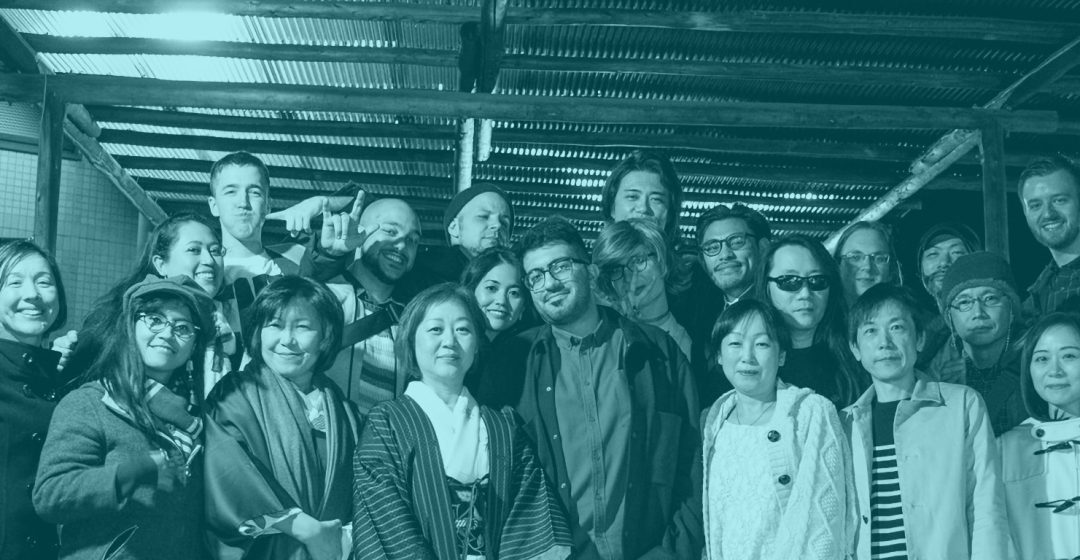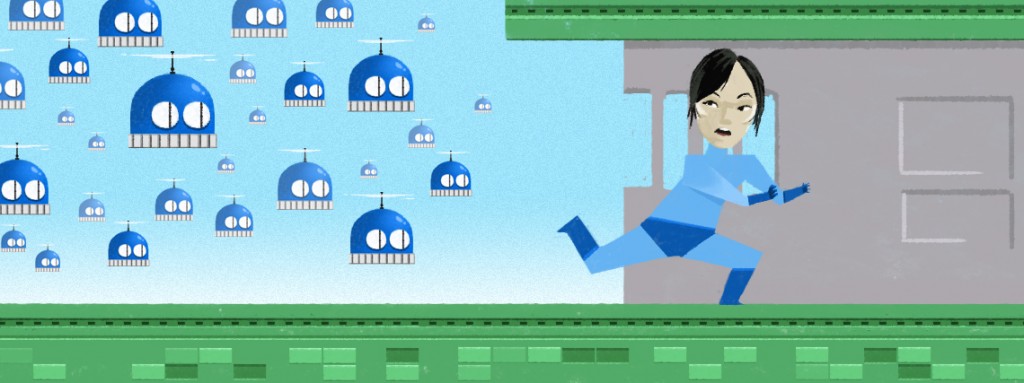Manami Matsumae is the composer of the original Mega Man video game, developed and published by Capcom. In this brief chat, we let her share stories about her past and the development of Mega Man, as well as talking about music and her new track for our debut album World 1-2 .
Mohammed Taher: Hello, Matsumae-san. I’m happy to be having this conversation with you.
Manami Matsumae: As am I. Nice to meet you. This is the first time I’m interviewing with a person from Kuwait, so I’m pretty excited. Thank you for the opportunity.
Mohammed: My very first Famicom game was the original Mega Man. The series had a great impact on me and my brothers — and it still does. The game was really hard, though; I remember I used to cry a lot for dying at Guts Man stage over and over again. (laughs)
Manami: Yeah, indeed Guts Man’s stage is difficult. I also end up falling and dying right away. (laughs) Just between you and me, I have actually yet to complete Mega Man.
Mohammed: Interesting! We’ll get to that later. Let’s start with the expected question: How did you start making music?
Manami: When I was around 4 or 5 years old, I listened to a song my father played on his acoustic guitar once, which apparently led me to playing an organ (which had the perfect sense of pitch), surprising my father. So he brought me to a music class, where I began learning the piano. That’s how I began my foray into music.
After that, I did nothing but played the piano and eventually entered college. I didn’t engage in activities such as playing in a band during high school.
During my 4th year of college, I was thinking about what I wanted to do after graduating, and I thought about becoming a piano teacher since I was majoring in it. One day, I happened to see a job hunting bulletin at university, which said that Capcom was recruiting people who could create music.
At that time, I was into music for games such as Super Mario and Dragon Quest, and I knew that Capcom was a game company as well. Therefore, with a bit of curiosity as to how this would turn out, I ended up applying for it. I figured that even if I didn’t get the job, I still could become a piano teacher. Yet somehow, I managed to get hired.
Until then, all I did was study musical composition in my university classes. All I did was create a number of original songs during my tests. Those were also classic-style songs. Therefore, after joining Capcom, I would end up suffering from musical composition. (laughs)
Mohammed: After joining Capcom, what was your first project?
Manami: My first product after entering Capcom was one song (a classical type song) for Ide Yosuke’s Jissen Mahjong.
Mohammed: Oh, so Mega Man wasn’t your first game to compose at Capcom. Have you done a lot of work before working on Mega Man?
Manami: Yeah, a lot of people believe that my first work was Mega Man. However, before even making it to that point, I needed to do a lot of practice as a new employee at Capcom; that’s why I ended up making one song for Yosuke Ida’s Jissen Mahjong, and when my seniors at the company OK’d my work, I was asked to help out with the other team for the first time. So at that point, I ended up creating music for Mega Man.
Mohammed: As a person who has been classically — and professionally — trained, did you find the limitations of NES hard to deal with? You only have three sound channels, for example.
Manami: Regarding my composing music with 3 sound channels, it wasn’t actually all that stressful. That’s because in college, I played Bach’s The Well-Tempered Clavier to the point where people got sick of it. (laughs) The Well-Tempered Clavier is 3-4 sound channels, and a piece of work that can really impress its audience through the feel of its beautiful chords. I had been studying that, so I didn’t have any issues at all. However, I didn’t have any experience with rhythm-based songs (drums) at first, so I studied the drum by listening to a lot of the music that was popular at that time (Propaganda, Phil Collins, Mezzoforte).
Mohammed: That’s fascinating.
Back then, no one could have predicted the success of Mega Man as a mascot, and this is the first game in the series — so you have no grounds to walk on. You built those entirely. How did you decide what feel and music you wanted to go for?
Manami: I’m happy you’re saying that. I myself had no idea Mega Man would go on for this long. When I saw a screenshot of Mega Man, I imagined him being cool and strong with a heroic presence, like the Astro Boy anime. Therefore, when I told the planner I wanted to create a lively melody song that was easy to remember, like that of an anime song, he told me, “That’s OK!” And so I created the song in that manner.
Mohammed: Mega Man’s Japanese title is Rockman. I wonder, was it built from the very beginning to rely heavily on music? I mean, Rockman, and then Blues (In the US, his name is Proto Man), then Roll, and we also have characters like Bass (in Japan, his name is Forte) and his dog Treble. Rock, Roll, Blues, Bass, Treble. Was this established since the game’s inception, or was it decided later on?
Manami: I don’t believe it was decided from the beginning to be like that. When I was still at Capcom, I remember the composer of Mega Man 3 saying, “With Mega Man 3, this time we’re going to make a blues whistle!” There was also a change of planners beginning with 3, and many characters were made after, who each had their own music.
Mohammed: Yeah. When you think about it, Mega Man did something brave and different: It changed the composer in every new release. The original game had you, Matsumae-san, composing it. The 2nd game was composed by Takashi Tateishi, and the 3rd game was by Yasuaki Fujita, and so on. This brought up diversity in music.
Manami: Exactly. After I handled Mega Man, I ended up moving onto the arcade section (business-related), so after that, Tateishi-kun was put in charge. He did a wonderful job grasping the music the planners wanted, and the music I created, which led to him creating cool evolutions of those, which is why Mega Man 2 was such a major title that was a boost above the previous game. His music is very much worth of the praise it receives. He ended up moving onto a different company afterwards, so Fujita-kun ended up doing a wonderful job with Mega Man 3 as well.
Mohammed: Personally, I see your involvement with the original Mega Man as the most important part of the series. You made some of the most iconic sounds in all of video games: The sound effect when you die; when you get an extra life (one-up); the short jingle after you select a stage; the sound of a boss’s door when you enter it. Some of them might be simple, but they carried through the entire series. I see your legacy in the subsequent Mega Man games, even though you weren’t given another chance until 23 years later.
Manami: I’m pleased to hear you say that. Nowadays, usually music and sound effects are done by separate people, but at that time, I had to create both. The sound effect when you die or get an extra life, among others, are quite popular today. The boss and stage music are still loved.
Mohammed: Indeed. So now, after all these years, what’s your favorite music from the original game?
Manami: Hmm, probably Cutman and the Ending. Cutman was the first song the planner gave the OK on, while I liked the ending because all the stages were upbeat tempos. I’m quite fond of the slow tempo of the ending.
Mohammed: Right. So, you said you didn’t finish the game. What stage gave you the most trouble, and made you give up playing? Guts Man stage was bothering me when I was a kid, but right now it’s definitely Ice Man stage. This guy is not as nice as he looks. (laughs)
Manami: Well, it’s Guts Man for me still. (laughs) I never got down the timing of jumping across the moving floors, so I always ended up falling. Guts Man and Iceman have those moving floors that appear and disappear, which I hate as they’re so difficult. (laughs)
All of this stands as long as we’re talking about the product that was eventually released. In actuality, I’ve beaten the game only once! While developing a game, you have to verify the music and sound effects while playing through it. But since I was always dying at the Guts Man stage, I cried to the programmer, telling him that I couldn’t make progress on my checks, so I had him make a ROM with the game’s hit detection removed. So, no matter how many times I fell, or how many times an enemy hit me, or how many times I fell into a sea of lava, I never died. (laughs) I used that neutered ROM to beat the game and finish my checks.
Mohammed: That’s a combination of cute and nasty! (laughs) When you were composing the game, were you aware of the levels? (Fire, Ice, etc.) And when you played it for testing, did you make adjustments to the music, or were you pleased for your work on each level?
Manami: I knew about the layout of the stages during the music composition stage. It’s important for there to be a balance of sound effects and music during testing, so there are times when we had to lower the volume down, but there weren’t any instances in which I actually had to change the composition of any of the music. The sound effects, which are one-note chords, play onto the music, which are three-note chords, so I had to do things such as shorten the sound effects, as well as adjust them so they don’t cut into the melody of the songs. But since it was my first time supervising such a project, there are places where the sound effects cause the melody to go away. (tear)
Mohammed: I read somewhere that you contributed to the music of Air Man from Mega Man 2. Is this true?
Manami: Huh? Where did you hear that?! (laughs) Indeed, I did write measures of Air Man’s melody, but only a small number of people are supposed to know that.
Mohammed: I learned this information from a fan site. Fans dig deeper than you might think. (laughs) Did you collaborate on more tracks within Capcom, or was it just Air Man?
Manami: All I did for Mega Man 2 was Air Man. The opening theme of Mega Man 2 was crafted as a continuation of the ending theme of the original Mega Man, so I provided the ending theme data over to Mega Man 2’s composer.
Mohammed: Okay, let’s shift gears to Mega Man 10. I think Capcom did an impressive job: They brought Mega Man’s past composers all together to compose for the game. How did this happen? Did they just call you and tell you “We want you on this new Rockman game”?
Manami: After leaving Capcom, for the most part, I didn’t work with them again. A year before composing for Mega Man 10, I did an arrangement for Mega Man 9 (We’re The Robots). The supervisor for Mega Man 9 then told me that the past composers would be brought together to compose songs for Mega Man 10, and that I was wanted for that as well. I was happy to be composing music for Mega Man after such a long time.
Mohammed: And it’s interesting how Capcom handled it: Past composers made the music for the robots, while Inti Creates’ sound team (III) handled Wily stages.
Manami: Yeah, I too think that the idea for the composers was planned out very well.
Mohammed: Were you shown the level (or character design) of Nitro Man before making the music for it, or did you just hear about the idea?
Manami: When composing Nitro Man, all I had seen was the character design for Nitro Man. I had no idea what the stage’s design was; all I had was the Nitro Man image and someone telling me to make an up-tempo song. I ended up making that song right away after seeing the character design. I think it took less than a day?
Mohammed: Less than a day?! I’m impressed. You did a great job — I truly love it. Apart from Mega Man 10, have you been doing any work for video games?
Manami: I haven’t done much work in video games recently. I have done a few small projects, but that’s pretty much it. If you’re doing freelance work, you have to manage and then find work on your own, but I haven’t even been doing that lately. It’s tough when you’re in between jobs/assignments. Also, recently many young composers have arrived on the scene, and they’re creating good music. I feel that the younger composers, as opposed to older ones such as myself, are a closer match to recent games. There are also many young people involved in the development of games. So, I think it’s better for younger people to be doing this. (laughs) With that said, if anyone requests that I do something for them, I wouldn’t mind — even if from outside of Japan. (laughs)
Mohammed: And luckily, that happened to be me, when I approached you for World 1-2. You and I wanted to make a track that resembles Mega Man in its groovy nature. How about you tell me more about it?
Manami: When I heard about the album, you asked to make a song resembling the early days of Mega Man, as well as something akin to Mega Man 10. This was something that would, as a result, be different from the music of recent games. I interpreted this as you wanting a song that harkened back to the melodies of the olden days of gaming. So, I went with a melody that’s very easy to remember, a song that you can give lyrics to and sing, and a song that’s catchy enough to get into your mind.
As for the software, I’m using the Cubase sequencer. The sound source is HALion4, Kontakt4, Fantom-XR, and others.
Mohammed: And it turned out fabulous — very much like your signature Mega Man style. Haven’t you thought about doing a solo album? You know, something that’s totally “Manami” and not tied with anything else.
Manami: I’m happy you really liked it! As for a Manami-like solo album… (laughs) I’m happy you feel I’m worthy of such a thing.
Mohammed: Right now, I’m working with Keiji Yamagishi (composer of Ninja Gaiden) on his first solo album. Maybe after that, you and I could visit the idea of working together again…but on a larger scope.
Manami: You’ve asked me quite often to make an album! And I’m honestly very grateful for that. Yeah, someday, we should have a go at it, as long you’re happy with what I have to put forth or if I can put my heart and soul into it. Well, that’s not as fancy as it sounds. (laughs)
Mohammed: And that’s a conversation for another time. Thank you for your time, Matsumae-san. It’s been a pleasure talking with you and reminiscing about the past. I hope to play a new Mega Man game with your music in it again!
Manami: Thank you too, Mohammed! I’m also very happy to have been a part of this project. I look forward to when we can work together again.
Translation by Alexander ‘cvxfreak’ Aniel; header image by Andy Helms.


